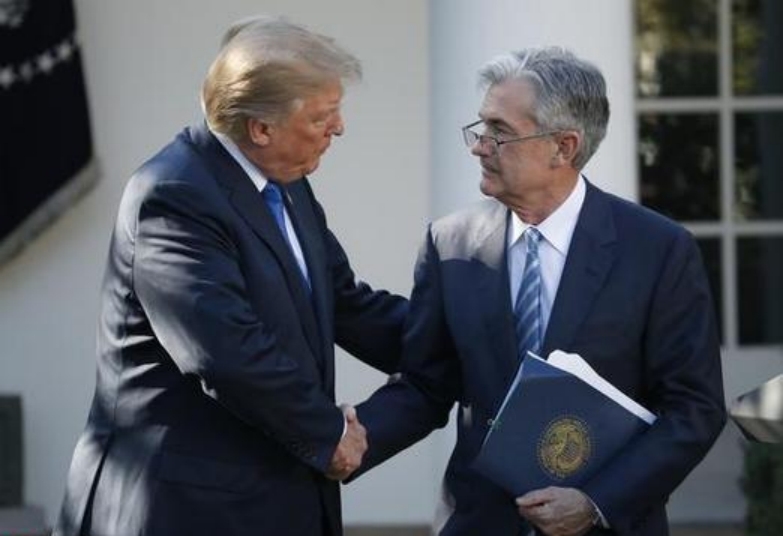
Recently, the direction of the Federal Reserve's monetary policy has become the focus of attention in the global financial market. Under the complex and volatile economic situation, there are differences within the Federal Reserve on whether to cut interest rates. Meanwhile, Trump has been continuously pressuring the Federal Reserve to achieve a significant rate cut, which has put Federal Reserve Chair Powell under tremendous pressure. A game of monetary policy is unfolding.
At the Federal Open Market Committee (FOMC) meeting in June, the Federal Reserve decided to keep the target range for the federal funds rate unchanged at 4.25%-4.5%, a decision in line with market expectations. However, the meeting minutes show that there are obvious differences within the Federal Reserve regarding the future direction of monetary policy. Some officials believe that if economic data continue to indicate that inflation is under control and the labor market remains stable, it will be necessary to cut interest rates in the future to prevent an economic recession. While another group of officials are worried that an early interest rate cut might trigger an inflation rebound and advocate maintaining the current interest rate level and waiting for further economic development.
Trump has always been critical of the monetary policy of the Federal Reserve. Recently, he has once again intensified the pressure on the Federal Reserve, demanding that it significantly cut interest rates. Trump believes that cutting interest rates can not only reduce the government's debt cost, but also help stimulate economic growth, improve the performance of the stock market, and add points to his economic policies.
At present, the total federal debt of the United States has exceeded 35 trillion US dollars. High interest rates have significantly increased the borrowing costs of the government. The interest expense in the fiscal year is close to 1 trillion US dollars per year, becoming the second largest expenditure after defense and social security. Trump hopes to relieve the government's debt pressure by cutting interest rates and allocate more funds to other policy areas.
Furthermore, Trump is also worried that the slowdown of economic growth will affect his political approval rating. Interest rate cuts can stimulate investment and consumption in the short term, boost the stock market and employment, and create a prosperous economic scene. This is crucial for Trump, who is seeking political support. He has repeatedly criticized Powell on social media, calling him "a guy with slow decision-making and wrong direction", and even threatened to force Powell to leave.
In the face of Trump's continuous pressure, Powell repeatedly reaffirmed the policy independence of the Federal Reserve, emphasizing that decisions will be "entirely based on considerations that are most beneficial to all Americans" and will not be disturbed by political factors. Powell is well aware that the independence of the Federal Reserve is the key to its effective implementation of monetary policy and maintenance of economic stability. Once the Federal Reserve gives in to political pressure, it may trigger market doubts about the credibility of the Fed's policies, leading investors to sell off dollar assets such as US Treasuries, and subsequently trigger capital outflows and a sharp increase in interest rates.
The outcome of this game between Trump and Powell will have a profound impact on the US economy and the global financial market. If the Federal Reserve cuts interest rates too early under Trump's pressure, although it may stimulate economic growth in the short term, in the long run, it may cause runaway inflation and lead the economy into a stagflation predicament. Furthermore, interest rate cuts may also trigger changes in global capital flows, posing challenges to the financial stability of emerging market countries. A large amount of capital may flow back to the United States from emerging markets, leading to currency depreciation, stock market decline and rising debt risks in emerging market countries.
On the contrary, if the Federal Reserve insists on its independence, withstands political pressure and does not cut interest rates easily, the US economy may face greater downside risks. An economic recession may lead to an increase in the unemployment rate, business closures, and thereby affect social stability. The global financial market will also be impacted. The US stock market may fall sharply, and the US Treasury yield curve may further invert, triggering market panic.
The game between Trump and Powell over the Fed's interest rate cut is still ongoing. This game not only tests the independence and decision-making wisdom of the Federal Reserve, but also relates to the future direction of the US economy and the stability of the global financial market. Investors need to closely monitor the policy developments of the Federal Reserve and the economic policy adjustments of the Trump administration, and do a good job in risk management and asset allocation.

On January 7th local time, GameStop (GME.US) announced that the company's board of directors had approved a potential executive compensation package worth $3.54 billion, which was targeted at the company's CEO, Ryan Cohen. At the same time, this new compensation package set extremely high performance thresholds: Cohen, the CEO, needed to increase the company's market capitalization from $9.5 billion to $100 billion.
On January 7th local time, GameStop (GME.US) announced that…
According to the British media The Guardian, recently US Pr…
In today's era of deep integration of globalization and dig…
In early 2026, US President Trump forcibly took control of …
Recently, the corn market dynamics analysis released by Aus…
Donald Trump has proposed an "immediate" restriction on lar…